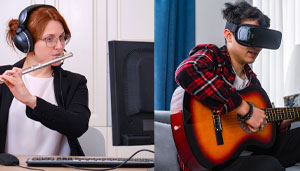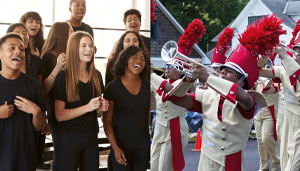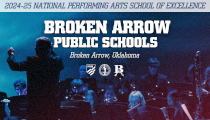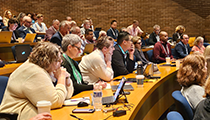Teaching Music to Students with Special Needs: Strategies for Teaching an Adaptive Music Class
By Mallory Merkel on January 03, 2024 advocacy PrintIt is becoming more common that secondary music educators are asked to take on a class of special education students. This can be cause for some anxiety as it may be difficult to know how to go about teaching an adaptive music class. A number of years ago I was tasked with developing a class specifically for secondary students in a self-contained special education setting that would meet daily for music instruction. Incorporating students with specific learning and developmental needs into a school music program is something I have been able to do successfully since then. A self-contained class such as this can have a wide range of diagnoses and abilities: emotional behavioral disorders; the autism spectrum; and severe disabilities that cause students to be wheelchair bound. These are some strategies I have found to be most effective when going about teaching students with special needs.
Get to know your Special Education team!
The Special Education team in your school is your most valuable resource. Often, the aides that work with these students have been with them for multiple years and know them very well as individuals and can give you insight into their behaviors and things that work well for them in the education setting. Special Education teachers have the experience of creating lessons specifically for the students on their caseload and can also provide you with ideas and approaches to use. Aides will almost always accompany students in a self-contained class and can help provide a one-on-one experience for each student. Learn what kinds of adaptations and accommodations are helpful (or possibly even required) by reading each student’s Individualized Education Plan (IEP). Getting to know everyone who is involved in the Special Education department is the first step in getting to know your students, their needs, and their abilities.
Adapt what you already do to fit the needs of the students
As a band director, teaching music with instruments is what I know best and am naturally most comfortable doing. I teach the basics of rhythm and note reading with world drumming, and move to simple note reading with mallet instruments and Orff arrangements. Boomwhackers are always a fun way to explore and play along with some classical music when learning about composers. Some students are more able than others when it comes to how much playing they can do during class, so finding an instrument that will allow them to participate and contribute is what is most important. This may mean using a shaker or tambourine to simply keep the beat with the rest of the class. Color coding notes with corresponding locations on instruments can help get a student playing. A unit on recorders that uses a limited range of notes can be a great way to work on fine motor skills.
Be prepared and be predictable
Often, students with special needs rely heavily on a schedule. Even the slightest upset to the schedule can have the tendency to throw off their entire day. Establishing a routine in class, keeping sensory overload to a minimum, and having a space free of distractions will help students focus. Using visuals to signal what is coming or to aid in understanding a musical idea will help students process. It can be a challenge to know if a lesson you have in mind will work with any particular group. Certain sounds may be a cause for upset, or a lesson just may not engage in the way you hoped it would. Sometimes by trial and error you will stumble on what is really effective with students with various needs. When you find activities that work well for a class, have them accessible for the times you may need to change your plans at the last minute!
Design a music class for all
The approach in teaching an adaptive music class will not be the same as that of a band class. These students may struggle with fine motor development, social skills, or hand-eye coordination. Music may be a means for students to achieve non-musical goals. Modifications to the way an instrument would typically be played can help the student be able to participate more fully. Limiting mallet instruments to one mallet at first while working on simple melodies, allowing the use of both hands to get holes covered on a recorder (as independent movement of fingers may be limited) while working on B-A-G melodies, and helping students learn how to play by practicing movements with them hand-over-hand all can be ways to get them making music. Basic rhythmic literacy can be achieved with the use of Kodály syllables. Music games that promote cooperation and coordination can be a great way to get students moving and working together. They also may need more time and repetitions to learn, so going slowly with lots and lots of patience may be necessary. Adaptive music should enrich the lives of students with special needs and give them the opportunity to experience, create, and grow through the use of music.
I have found teaching students with special needs to be one of the most rewarding experiences of my teaching career. There is so much joy to be found in giving these students an opportunity that may otherwise be overlooked. Small moments can be leaps and bounds for students with special needs--from the initial excitement of being able to play an instrument to the first time a group that struggled with cooperation takes it upon themselves to play an Orff arrangement with no adult direction. I have incorporated self-contained students into my regular band for performances as well as held small concerts to show off what we have been doing in adaptive music for the rest of the student body. Students with special needs want to be able to be like their peers who do not have labels, and our job is to provide them with the best possible musical experience. Music offers us the chance to bring our students together in a way that no other discipline can.
Mallory Merkel
This article first appeared on the DANSR - Vandoren website. Vandoren has been committed to beautiful music through quality, innovative products since the company was founded in 1905. Now in its fourth generation, the Vandoren family continues to craft the highest quality reeds, mouthpieces, ligatures, and accessories in the world and maintains close relationships with the artists, educators, and students who depend on them. Check out their website here. Please view the original article here.
Most Recent Articles







